0:01-15:25: Greetings from Graeme “I Have To Share With The World” McMillan and Jeff “I’m A Little Worried” Lester dig into our ten year anniversary of this podcast with a deep dive Q &A episode. But, first, we’re sure you’re asking yourself: what was happening in the pages of Marvel Age magazine preview for 1992? Thank goodness for you Graeme has the answer. Also discussed: the second Nomad, the third Nomad, and what happened to the second Nomad and who was responsible; vagueness related to possible tenth anniversary celebrations; Graeme shocked that Jeff hasn’t been high during recordings; how many episodes we’ve actually posted (that to be clear, Jeff was *not* high for); how in-depth the following questions are, and more.
15:25-32:17: And we’re off to the races! Matthew and Anna (from Patreon) ask: I left this a comment on the last Drokk episode, but I’ll ask it again here. Do you think there have been any comics that have been effective at capturing the idea of “punk”? There have been a few titles in recent years that have been, at least on the surface (e.g. in the title), about punk, but none of them seem even remotely like the punk scene/community/ideas that I’m familiar with. Why do you think this might be? Could it be at least in part due to the idea of “punk” within the minds of the people writing these comics still being stuck in the ’60s and ‘70s?
32:17-54:27: Supercontext Ifrom Patreon) wonders: I’m curious what your take is on several newish comics publishers that have arisen in the last couple of years. I’m specifically thinking of companies like Action Lab, AfterShock, Black Mask, Lion Forge, TKO and Vault. The recent Lion Forge/Oni acquisition probably has a connection to this. While promoting creator-owned work, they seem to mainly be backed by venture capital investments, despite the small percentage of the market that remains for them to make a return on. I don’t often hear you guys talk about their books, so I’m curious if you are reading them. What do you think about their chances for success? How do you think they’re affecting the industry? And finally, what do you think differentiates them from one another? Thanks for the show. I look forward to listening every week.
54:27-1:02:58: Daniel Mckay (from Patreon): I’ve always been a bit curious about Jeff’s day job but I feel he’s been carefully quiet so barring any more details, I’ll just thank you guys for everything with words rather than just dosh. Thanks.
1:02:58-1:13:06: Dan White (from Patreon): my question is what value do you think there is in engaging with problematic work or problematic creators?
1:13:06-1:21:34: Ethanlj (from Patreon): I grew up a Marvel guy and didn’t start reading DC until post-Crisis with Legends and then JLI. I know there must be a ton of great stuff right before that time. What storylines or creator arcs from the first half of the 80’s really stand out? I’ve read and enjoyed Judas Contract and Great Darkness Saga but other than that it’s an unexplored world.
1:21:34-1:31:29: Follow up q from Ethanlj: Oh, another one (feel free to answer just one or none). With Fox’s X-men and Fantastic Four now dead and buried, how would you introduce these concepts into the MCU. Specifically, can you launch the Original X-Men (Scott, Jean, etc) in the year 2020, or does that really have to be in the Civil Rights Movement time in the 60’s? And same question for the FF… do you need a Space Race to make it work?
1:31:29-1:57:26: Patchen Mortimer via email: As I tweeted to Jeff, I’m currently going through your archives, and your Baxter Building and Star Brand re-reads were like getting two chapters of a psychobiography that now I cannot stop thinking about.
Like, when was he good? When was he great? When and why did he go wrong? And why did he hold such sway in the industry for so long, despite being—at least as a writer—manifestly hidebound, boring and bad?
Some background: As I think I’ve mentioned previously on Twitter, I always resented John Byrne for driving me off Iron Man, which was the title that got me interested in comics. I’d been reading comics for a year when he delivered the “Armor Wars II” storyline—a lifeless slog featuring neither Armor nor Wars. The supporting cast largely vanished; the Madam Masque subplot disappeared; there was a retelling of the origin. I held on for a year and then gave up mid-arc—7th-grade me had no patience for Fin Fang Foom (at least not Byrne’s version) and the X-titles had lured me away (coincidentally, just before the big 1991 X-summer shakeup that saw Claremont leave).
Being a middle-schooler, I didn’t think to blame the writer; I just knew things had Gone Wrong. But years later my grad school roommate and I would try X-Men: The Hidden Years and it was dreck. At the same time, we were re-reading my old comic collection, and lo and behold I suddenly connected the dots.
Then in the last year or so, I’ve been listening to podcasts like yours, and discovered he did this nonsense to COUNTLESS titles. For DECADES.
You guys have perspective and omnivorous habits I don’t. Any way you can take some time to shed some light on this? What drove him to be the way he was, what were his peaks and valleys, etc.? When you look at his career in total, is there a Unified Theory of Byrne beyond a guy who was envious of Claremont and who desperately wanted comics to go back to the way they were when he was 10? Is it that simple or is there more?
Anyway, just a thought, and thanks for the podcast!
1:57:26-2:10:15: Tomas Syrstad Ruud from email: Are the big two basically unable to make good Fantasy and Science-Fiction comics, because the creators are used to the character-focused Super-Hero genre, and take it for granted that they can make drastic changes to the underlying worldbuilding in a book when they take it over? See e.g. Wonder Woman, Legion of Super-Heroes.
I recently binge-read a lot of european (not british) comics. (Storm, Thorgal, Lanfeust). When listening to your latest episode it struck me that this is the one area of comics I can’t remember hearing you discuss. Do you have any interest in this section of comics? I don’t know how much is available in english.
2:10:15-2:14:35: Skye Adamczyk from email: A few episodes ago you [Jeff] mentioned your love of “incredibly well researched but batshit insane manga” and so you came to mind when I learned about Drops of God by Yuko and Shin Kibayashi.
To try and give an elevator pitch: it follows the formula of a lot of other battle manga, being about a young man who recieved brutal torturous training from his father to heighten his senses facing off against a rival who turns out to be a secret brother with the same training. The twist is, instead of fights its all about wine tasting.
Personally this is a field I know nothing about but the manga has a great reputation among the wine tasting community, effectively increasing the sales of each wine mentioned.
2:14:35-end: Closing comments…of a sort? Graeme is overjoyed we made it halfway through the questions (even after Jeff points out that we’re only a third of the way through the questions). By which I mean, we kinda can’t shut up, in part because Graeme wants to talk about reading Roger Stern’s run on Amazing Spider-Man and how good it is, and Jeff wants…to be Jeff, basically. Look for us on Stitcher! Itunes! Instagram! Twitter together and separately: Graeme and Jeff! Matt! Tumblr, and on Patreon where a wonderful group of people make this all possible, including Empress Audrey, Queen of the Galaxy, to whom we are especially grateful for her continuing support of this podcast. (Also, don’t forget about Spotify!)
Next week: Part 2 of Our Q & A episode! Why not ask us a question at waitwhatpodcast A T g mail.com?
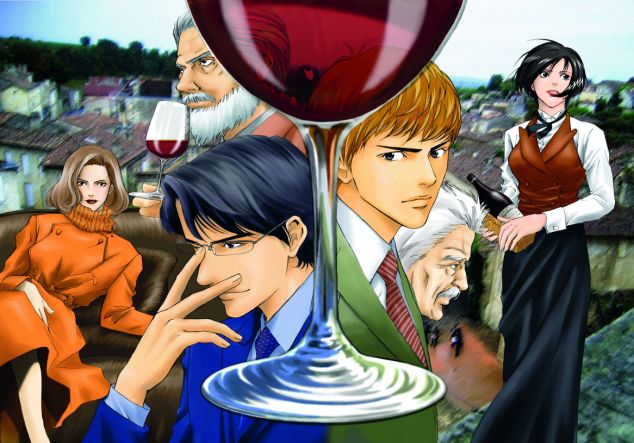
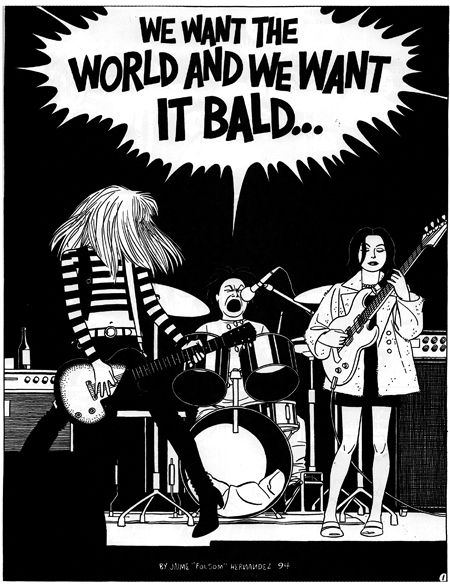
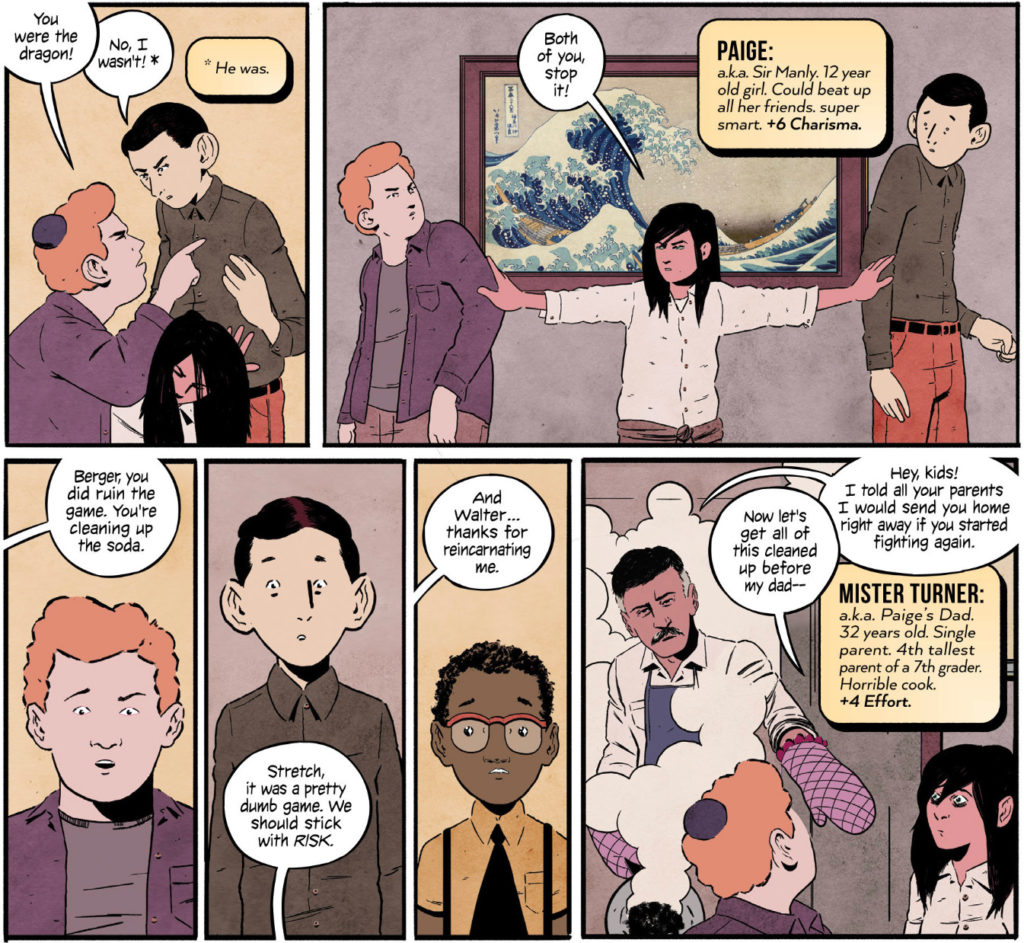
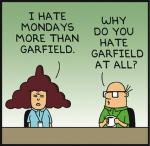

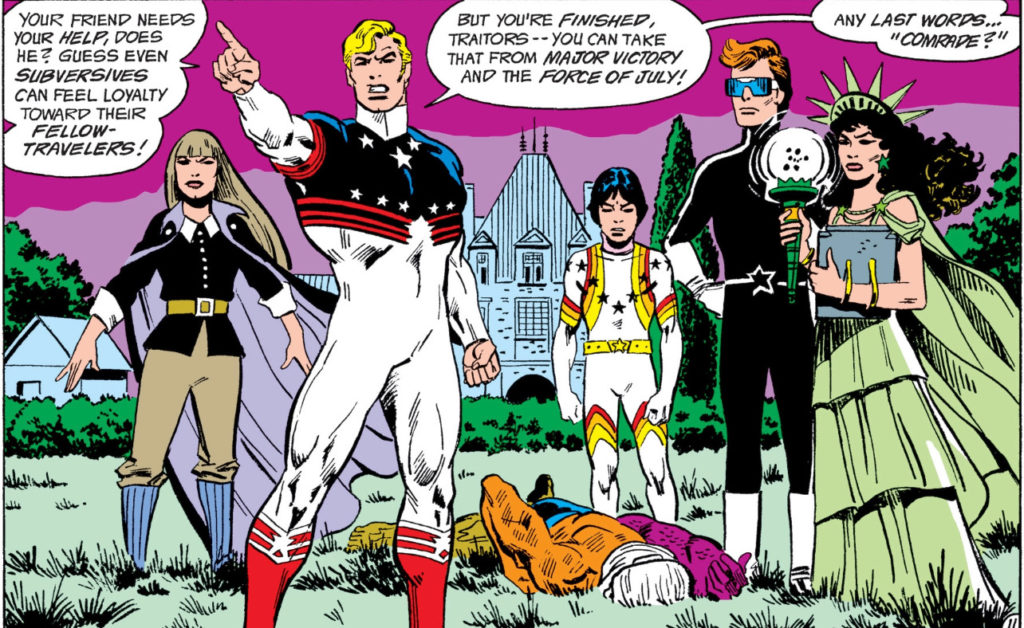
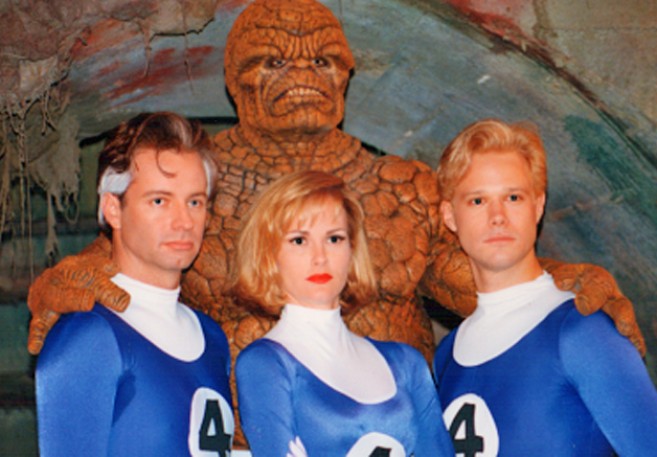
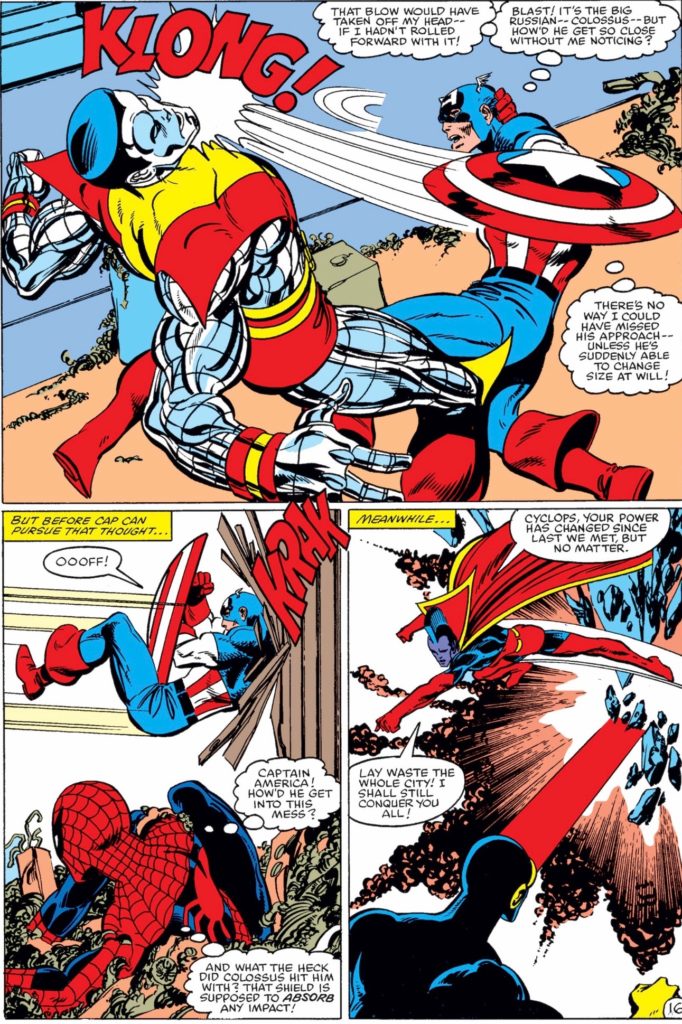
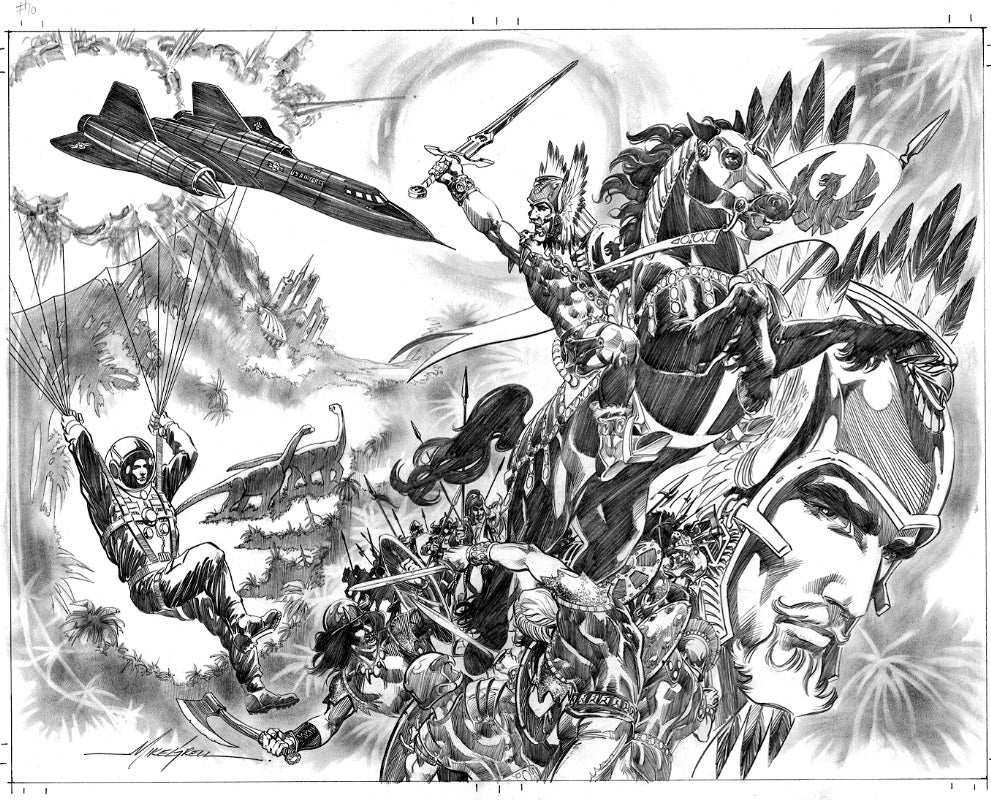
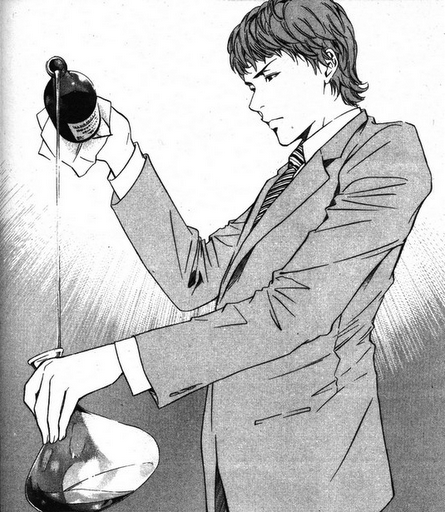


For the cutting, for the pasting, for good times, for relaxing times. Make it…Suntory time:
http://theworkingdraft.com/media/podcasts3/WaitWhat272.mp3
I guess you might address it in the next episode, but I’m not sure where the confusion is on who Scott Free’s mother is. Is there anything to indicate it’s not Izaya’s wife Avia, who was killed by Steppenwolf in the opening scene of “The Pact” to set off the war that ended with the exchange of Orion and Scott? A few months later in “Himon” we have Scott even quoting Avia’s words from his dreams.
I guess the question might be more “when” than “who”, since there’s no indication that Scott’s already born by that scene in “The Pact”, and he’s definitely not with his parents, but remembers Avia’s words. Kirby doesn’t address that, but I’d always assumed that Avia was pregnant in that scene, and while she died Scott lived.
(although doing some quick googling I see that some 90s comics added some confusion the whole thing, which I assume is safe to ignore)
I’m with Bob! Always thought Avia was Scott’s mother, especially because of his dream-memory of her words from The Pact…
A fine and accurate point that should teach me to check the foundational text before typing, but probably won’t. Re-reading I still have questions, though. Do we ever Scott’s New Genesis name? Presumably they called him something before they packed him off to Apokolips. Who brought him up for that time? Izaya seems to be absorbed by the war. It does look like it’s the encounter with the Source which ages him so significantly, as everyone else looks much the same. So why does Scott remember his mother from the womb and none of the rest of his life on New Genesis? We see he doesn’t understand why he’s different in the ‘Young Scott Free’ stories, so he doesn’t remember where he’s from.
One of the things I really like about Kirby’s Mr Miracle before the 4th World gets shot down is that he responds to attacks by Apokolips, but doesn’t join the war.
Hi chaps
I guess my question was really about what value there can be in reading by work by problematic creators, not with them as people – so a good (if obvious) example would be Dave Sim who is an exceptional comic creator but a deeply problematic creator. And the content of his work has become increasingly problematic for most people. But something like Glamorpuss is a fascinating, brilliant train wreck of a thing and I get more out of reading that than 90% of other comics even if I find large chunks of it actively distasteful. So really I was asking about your personal takes on that and at what point you disengage from work where those elements become overwhelming.
I don’t think my original question was phrased that well, sorry…
Dan: Sorry we more or less punted on this question, and I may return to it. As you know, I feel the same about Glamourpuss and feel absolutely the same about it and Sim (and Ditko and Mr. A, and probably a horde of others I’m not even thinking of at the moment, such as Al Capp).
I’ve been reading a lot of Eisner’s Spirit stories recently.. I don’t think I’ve ever enjoyed them so much, or been as disturbed by Ebony White. When I started reading these stories, which was with the second issue of the Warren magazine, I completely bought into the explanations provided. I was 12 or 13 living in very white part of the world. Those explanations now look like defensive rationalisations of a racist caricature. So I guess Eisner is on my problematic list.
God, I absolutely love how you can make an exciting Shonen-style manga out of absolutely anything, even wine tasting, and even have it be a success!
Also hi Graeme and Jeff, I just wanted to give out a big hearty congratulations to you both on ten years of podcast! That’s amazing! I’ve been listening for about seven of those years, and it’s kind of funny thinking about all the different parts of my life you’ve also kind of been a part of by having a conversation in my ears while I take public transportation, take walks in the woods, do house chores or draw comics. You’re both awesome, pleasant people, and I really enjoy your podcast!
David, thank you! I really meant to say so much earlier, but I very much appreciated hearing about the parts of your life we’ve been part of and for how long. Cheers!
Armor Wars II is a story unique in its terrible-ness. Pulling out a thread from Layton and Michelinie (who’s original idea for AW II was. . .interesting and much better what we got), John Byrne builds a story wherein Stark is menaced by a villain he doesn’t know, backed by two recurring villains from NAMOR (where the true finish to the story actually happens)
There’s an irritated indifference to making a good Iron Man story that manifests as Byrne tries to do a Byrne story that just happens to star Iron Man.
Hi guys,
Thanks for answering my question Jeff, you gave just enough to soothe my curiosity without (hopefully) getting Jeff in trouble. I was trying to word my question to give you guys the easiest out if you wanted. But I’m glad your promotion has been so positive I’ve only really noticed you mention work in relation to be busy/stressed so it’s really great to hear how good it’s been. Thanks again to you both you’ve been a constant in my life for longer than I care to remember.
Since it wasn’t in the show notes, I thought I’d repost Graeme’s suggestions for comics outside of the big three (?):
TKO – Fearsome Doctor Fang (https://tkopresents.com/products/the-fearsome-dr-fang)
TKO – Goodnight Paradise (https://tkopresents.com/products/goodnight-paradise)
Vault – Friendo (https://vaultcomics.com/comic/friendo/)
Aftershock – World Reader (http://aftershockcomics.com/world-reader/)
LionForge – Gender Queer (https://www.lionforge.com/gender-queer/)
Ahoy – Captain Ginger (https://comicsahoy.com/series/captain-ginger)
Thank you, MM! I admit the heat had me slacking a bit on the show notes.
If I may, over at Vault, another comic that is absolutely worth a look is These Savage Shores. Stunningly excellent book about Victorian vampires who decide to go over to India because they think life is going to be easier there, and find that it’s…decidedly not. The art alone is worth the ticket price.
I think there’s a few other things to add about Byrne:
Byrne got the nickname “Mr. Fixit” some time in the 80’s. I don’t know exactly when it was, but I remembered reading it in Les Daniels’ Marvel book decades ago. A Google search brought this article from 1989 that mentioned the nickname, so it had to be 1989 or before that: https://www.nytimes.com/1989/05/07/nyregion/the-man-who-energizes-the-hulk.html
Like you guys said, he came on board Fantastic Four and Superman, fixed it, and they sold extremely well. There was also that time when he talked about the sales increase on (I think) West Coast Avengers, that made him coin the phrase “faithful fifty”, in reference to how the West Coast Avengers got a boost of 50,000 when he came on board. And that’s probably why he fixes things when he comes on board, not just because he thinks he knows what’s right, but also because people expected that from him.
At the time he was doing West Coast Avengers, She-Hulk, and Namor (and scripting Avengers and Iron Man), it was also around the time that guys like Jim Lee, Todd McFarlane, and Rob Liefeld began to rise in popularity. You also didn’t get to touch on when Claremont left X-Men, they asked Byrne to script X-Men and Uncanny X-Men with Jim Lee and Whilce Portacio. He only scripted a few issues before threatening to walk off those books when Lee and Portacio were extremely late with their work. Bob Harras then made Scott Lobdell scripter.
Another thing I remember getting brought up was that his creator-owned books in the early 90’s were getting outsold by Erik Larsen’s Freak Force, which was being written by Larsen and Keith Giffen, and drawn by Vic Bridges, whose style was Byrne-like at the time. Also if you read through the Next Men letter columns you can see how much Byrne really didn’t like how Image Comics was handling things, so for an Image Comic (co-written by a guy he had arguments with, and drawn by a Byrne Clone) to be outselling Byrne’s Next Men and Danger Unlimited, that would be a real blow to him.
I’d also say that his return to Marvel in the late 90’s was when his star power took a major hit. He was given Spider-Man to fix, and his Spider-Man: Chapter One was subsequently considered noncanonical the year it finished.
Oh my god, Jeff, I LOVE Nana. I don’t read a lot of manga but I’ve been slowly working my way through the volumes at the library. I’m think I’m seven deep now (and I think there’s actually 20 already, not 13, if that sways you one way or another). I’m in it more for the writing than the art, although I do love the fashion, but that writing is so good. And tragic about the overworking and sickness of the mangaka, who amazingly and kind of terrifyingly, as I gather, still vows to revive her drawing skills and finish the series one day. I understand your feeling though, as when I talk to my friend about it, who recommended it to me, she’s tempted to reread it but doesn’t want to reach that non-ending again
Just some FYI for Drops of God. In Japan the series ran for 44 volumes and has an going sequel series that is at volume 17. Same creative team for both series. However, in the US Vertical only licensed the first 8 volumes that were released as two-in-ones. The fifth US volume, New World, is actually two later volumes that focus on American wines and it was at the request of the authors that the fifth volume was released like that. The plan was to license later volumes if the series proved popular enough but it wasn’t so Vertical didn’t license any more of the series.
Also, I take it Jeff or Graeme haven’t heard of the publisher Europe Comics? They publish European comics (obliviously) and I found them on comixology a while back. I only briefly looked through their catalogue but they had a decent selection of genres from SF/F to slice of life and what not.
Also, if Jeff is looking for more sports manga he should give Farewell My Dear Cramer a try. It’s super fun and all of the current US chapters are on comixology unlimited.
Thanks, Eric! I really appreciate this explanation–I don’t know why I thought the stall-out to US publication was due to anything but poor sales…I guess because it seemed like a lot of people at my comic shop and twitter feed were reading it when it came out?
I’ve bought and read a few Europe Comic selections through Comixology–they run a lot of sales, which is great for someone like me–but I don’t know if any of them rose above the level of, “yeah, that was pretty good.”
And thanks for the manga rec! I’m going to be on Haikyu for a while and I’m not sure where I’m going to pivot to next. (I make all kinds of old man noises about not being into kids’ shonen manga anymore, but I still haven’t read Toriyama’s Dragon Ball and I love the guy?)
I’d just like to pipe up for Cinebook, who are also putting a bunch of European albums into English and are on comixology. Unfortunately their delightful two book series ‘Green Manor’ doesn’t seem to be on there. It’s elegantly drawn madness and murder in Victorian London.
Hey there! Thank you for talking about my recommendation! (And yes Graeme, it’s Adam-check, good job!) If you’re curious, I heard about Drops of God from this interesting video on genre in anime and manga: https://youtu.be/kkg9BhISfdA
That said, that’s not what I want to talk about. As a trans woman I think it’s worth giving my two cents on Man Eaters. The book’s premise, that women are treated as second class citizens because menustration is dangerous, is trans exclusionary because it necessarily implies that trans women who don’t menustrate aren’t women and trans men who do menustrate aren’t men. Besides that, saying that periods are the root cause of larger misogyny is missing the forest for the trees a bit.
Trans issues aside, the book can be absolutely tasteless in its imagery. A white girl is told she can only drink from a segregated Girl’s Water Fountain. A white girl is brought to a concentration camp for girls. I’m not saying women are not oppressed in current American society, but to equate those issues with concentration camps, ESPECIALLY WHEN REAL MEXICAN CHILDREN ARE IN CAMPS RIGHT NOW, is insulting.
Now, to address the reason it came up in the episode: real world tweets were printed word for word as posters in the camp, with a little twitter logo as the signature. At best, this kind creator backlash can be kind of tacky. Superboy Prime is eyerolling to me. But this case, where the writer of an Eisner nominated best seller is playing victim and framing constructive criticism as literal misogynist propaganda, is basically sentencing the writers of those tweets to be harassed and mass reported by a much larger audience.
Sorry my two cents turned out more like two dollars but in short, yes, Chelsea Cain is a terf and you can tell by the trans exclusionary radical feminism in her comic. And yes, targeting those people in such a direct and mean spirited way was wrong of her.
Thanks again and happy tenth!
I wasn’t sure where to fit this in but as an update: she reached for (UNPAID) trans sensitivity readers in reaction to the controversy and deleted her twitter later that day.
I haven’t finished listening to the podcast yet, but my reaction to Jack Monroe as “The Jack Kerouac of the superhero set” is not so much “Oh no” as “That… that is not a thought that would ever have occurred to me.”
“The only people for me are the anti-commie ones, the ones who hate conchies, desirous of beating up drug dealers, the ones who are normal and never say anything not commonplace, but fight, fight, fight, like completely unfabulous squares in a bad mood and in the middle you see the blue costume and nobody, not even Mark Gruenwald, really cares about the character all that much,”
Seriously, I think someone must have gone for “Nomad” = “On the Road,” and not a lot else. But Marvel Age was desperate for hype that day, because if I were trying to sell a character to youngish comics readers in 1992, I know that Kerouac would be just the kind of of-the-moment reference I’d use.
And now I can’t stop. Beat poet Jack Monroe:
Men
who like men
made me
ugly uncomfortable
but then I became
the punisher
but for people in
color costumes
but then
the other bucky killed me.
Thanks for taking so long to answer my weird question about punk. I guess I just need to be reminded sometimes that most people don’t see punk as anything beyond loud music and weird haircuts/clothes. : )
I guess if I was looking for older “punk” creators I’d look at maybe Nate Powell? I mean, he even has “aging punk” in his Twitter bio! I remember I bought a Soophie Nun Squad CD from him at Emerald City Comicon forever ago.
As everyone knows, what’s really punk is debating what punk is and it turning out not to be punk after all.
At least in America — I thought our hosts were very sharp about authenticity vs. irony. I think, though, that’s a characteristic difference between American popular music and its British progeny in general, not something that’s specific to punk. There’s just so much of that capital-R Romantic this-is-how-I-feel about American rock, for instance.
Not obviously, that I’m claiming to know much about punk, and especially not American punk. I’m very similar to Graeme McMillan here, although I’m just that critical little bit older so that I can remember late ‘70s British punk, and I do listen to a fair bit of it, responding to it in the way that you instinctively like and respond to things that were around when you were a child.
And, hey, we’re back on topic for superhero comics!
Man, you have to love that page from Fantastic Four #250, the big anniversary issue, featuring… Captain America, Spider-Man, Gladiator, and a couple of fake X-Men.
Oh, and a shout-out to Patchen Mortimer, who I’m pretty sure I knew in grad school! Don’t worry, Patchen, I didn’t figure out Byrne sucked until the 90s either (though I don’t think I’d read any of his stuff since he wrecked West Coast Avengers).
I realize I should have congratulated you on ten years! I remember when you started I was annoyed because I wanted more text reviews on The Savage Critic. It was a few years before I started to listen. Now it’s one of my favourites!
To add to Eric’s comment, I think Europe Comics are a kind of interesting thing. They’re the North American arm of a number of different European publishers and only release books digitally. My understanding is that one of the reasons they exist is so that publishers find out about European comics and license them for physical print. They have over 50 titles in Hoopla right now if people want to read any of them.
Warlord! What seems weird (maybe?) is that Grell was only involved with about the first 50 issues, and then the title ran for another 80!
As for problematic comics/creators, I talk about this a lot of with library folks wanting to build comics collections. I tell them that there are a lot of historically “important” comics that they don’t need to have in their collections. I mean, if you have a comics studies department? Yes, have them all. But if you’re a public library? You don’t need to have old work that few people will read.
Other comics from the 70s and 80s I’d consider punk, or exhibiting “anarchy + DIY” aesthetics: Alan Moore’s DR & Quinch (and maybe Halo Jones?), Tank Girl, the works of Shaky Kane, early Eddie Campbell stuff like the Eyeball Kid, McKeever’s Eddy Current, Bernie Mirault’s The Jam…
Re the man called Byrne: I’ll agree with everything you said. His first Marvel works with Claremont were extremely attractive, in my mind combining the lines and layouts of Kirby w/ Neil Adams. And he was extremely reliable, never seemed to miss a deadline, which probably helped to keep his fanbase growing.
I was not a really big fan of his Superman, though I appreciated, at first, his attempt to modernize the concepts. Didn’t care for him removing the nerd/nebbish aspects of the Clark Kent identity — making him a football star and popular author took away one of the main appeals of the character (if only people could see beyond the facade and see the real me). And then when he had Superman execute the Phantom Zone villains… Zack Snyder apparently was a fan of that bit, at least…
Wasn’t too big a surprise after that disappointment to see him undo Englehart’s Avengers characters, but it was the end of my looking-forward to his new work.
I’ll admit I kind of liked his work with the Legend imprint at Dark Horse — the brand formed for Byrne, Frank Miller, and Mike Mignola. Seemed to be a turning point in his career as his Next Men didn’t get the sales or acclaim of Miller’s Sin City or Mignola’s Hellboy titles for Legend, and he left the imprint to go back to working with the Big Two, with much less ‘luster’ than before.
Re 80s DC books and storylines to rediscover: Surprised Suicide Squad wasn’t mentioned. I’d also recommend the first round of Secret Origins where one-half of the book was Roy Thomas re-telling a Golden Ager’s origin story and the second-half featured a modern-character’s beginnings. Or Wasteland! Also, the Messner-Loebs’ stories in Flash and Dr. Fate, and the oddball non-DC Universe books like Bates & Colan’s Silverblade, McGregor and Colan’s Nathaniel Dusk, Wolfman & Colan’s original Night Force run, and Doug Moench limited series like Slash Maraud (with Paul Gulacy) and Electric Warrior (with Jim Baike).
Speaking of Moench, I’d recommend his Pre-Crisis work on Batman and Detective Comics with a long-running storyline which brought Catwoman more-closely into the Bat Family fold. Lots of very interesting stuff there, with great art by folks like Don Newton, Dan Day, and Gene Colan. The Catwoman relationship established by Moench was then undone shortly after Crisis by editor Denny O’Neill. Often wondered if Tom King was a reader of these works, given his current long-running storyline with the Batman Family.
Anyhow, thanks for another great Q&A podcast… on to part Two!
Is Thor a fantasy comic? I know there are bits where he functions as a superhero, but those seem increasingly less prominent. Is there something about the execution that means it’s primarily a superhero book, no matter how many of the trappings of fantasy it has?